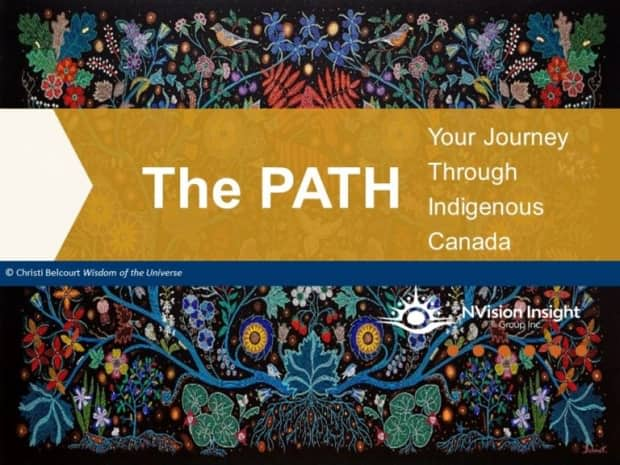Mandatory Indigenous course at risk after group of lawyers aims to change Law Society rule

The fate of a required Indigenous course for Alberta lawyers is at risk after a group petitioned the Law Society of Alberta (LSA) to remove a rule that allows the regulator to mandate legal education.
Currently, all Alberta lawyers are required to take a free, five-hour online course called The Path, which teaches Indigenous cultural competency. Those who don't face suspension.
After receiving a petition signed by 50 of the province's 11,100 lawyers, the law society has issued notice of a special meeting set for Monday. On that day, lawyers will vote on LSA Rule 67.4 regarding mandatory education.
In a letter sent to the province's lawyers Tuesday, the Law Society of Alberta's benchers, also known as its board, asked for support in opposing the resolution to be tabled Monday.
'Privilege' of self-regulation
The letter, along with a second document titled Frequently Asked Question (FAQ), was distributed to lawyers in the province on Tuesday morning and focussed on what the benchers described as the "privilege" of self-regulation.
"This motion comes as self-regulating professions face intense scrutiny," wrote the benchers.
"Policy makers, along with the general public, are paying close attention to whether organizations like the Law Society are focused on the public interest or on member interests.
"If we value self-regulation, we must ensure that we continue to discharge our duties using the lens of the public interest in everything we do, including continuing professional development."
'Mend broken relationships'
The mandatory course was developed in direct response to the Truth and Reconciliation Commission of Canada's Call to Action 27, which asks the Federation of Law Societies of Canada to "ensure that lawyers receive appropriate cultural competency training."
Since it was enacted in 2020, Rule 67.4 has been used only to mandate The Path.

Indigenous defence lawyer Krysia Przepiorka says she was disappointed to learn of the efforts to get rid of the required course.
"Indigenous people are underrepresented in the legal field and overrepresented in the legal system," said Przepiorka.
"Cultural competency is important because it helps … repair systemic biases and mend broken relationships and trust with Indigenous peoples and communities."
Petition organizer says rule reminds him of China
The course launched on April 21, 2021, and lawyers in the province were given until October 2022 to complete it.
In November, the LSA handed administrative suspensions to 26 lawyers who failed to complete the course within the 18 months provided.
"We are not asking you to immerse yourself in our culture, we are asking you to understand what was taken away and the subsequent impacts that followed," said Przepiorka.
Calgary-based lawyer Roger Song is the first signature on the petition and the organizer of the effort.
Song, who moved to Canada as an adult and attended law school in Alberta, says the mandatory course and the penalty for failing to complete it remind him of his time in China.
"The law society can impose whatever education program … if they believe that type of program is necessary for the lawyers. That type of regime is wrong," said Song.
JCCF lawyer calls course 'political indoctrination'
Song also says he does not believe Canada as a country has a history of systemic discrimination.
"To me it is not," said Song in a phone interview. "You can believe what you want to believe."
Others who have signed the petition are more overt in their feelings about the course itself.
Glenn Blackett, a Calgary-based lawyer with the Justice Centre for Constitutional Freedoms, wrote a blog post about the mandated course calling it "re-education, or indoctrination, into a particular brand of wokeness called 'decolonization.'"
"Law societies are empowered to ensure lawyers know the law and behave ethically. Law societies are not empowered to force lawyers to submit to political indoctrination of any kind," wrote Blackett.
'Anti-Indigenous sentiments'
The Path "was designed to help Canadians increase their Indigenous cultural understanding in a Canadian context," according to its description on the law society's website.
The course was vetted by Indigenous lawyers, the LSA's Indigenous advisory committee, the lawyer competence committee, and the Law Society's Indigenous initiatives counsel.
Chad Haggerty, a Métis lawyer in Calgary, believes the motivations of those who want the LSA rule repealed "reflect anti-Indigenous sentiments that are prevalent in Canada."
'You can't mandate common sense'
But Haggerty feels the best place for mandating courses like The Path is in law schools.
"You can't mandate common sense or compassion," said Haggerty. "Mandating it is the wrong approach because opening closed minds is next to impossible."
But Przepiorka disagrees.
"We have to remember there's a whole world of practising lawyers that aren't going to law school that are dealing with serious issues that pertain to or may affect Indigenous people.
"So I don't think we can just draw a line in the sand and say, 'OK, we'll start dealing with people in law school.' We have to deal with the people that are currently practising."

 Yahoo Movies
Yahoo Movies 
